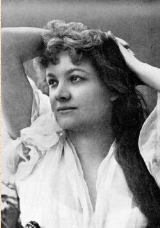
Ilka Pálmay
Encyclopedia
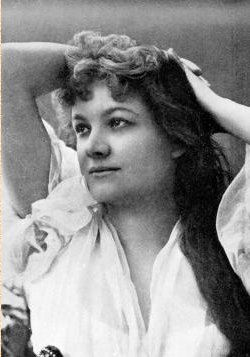
Operetta
Operetta is a genre of light opera, light in terms both of music and subject matter. It is also closely related, in English-language works, to forms of musical theatre.-Origins:...
at the Theater an der Wien
Theater an der Wien
The Theater an der Wien is a historic theatre on the Left Wienzeile in the Mariahilf district of Vienna. Completed in 1801, it has seen the premieres of many celebrated works of theatre, opera, and symphonic music...
in Vienna
Vienna
Vienna is the capital and largest city of the Republic of Austria and one of the nine states of Austria. Vienna is Austria's primary city, with a population of about 1.723 million , and is by far the largest city in Austria, as well as its cultural, economic, and political centre...
. She was married to Austrian Count Eugen Kinsky in the early 1890s.
In 1895, Pálmay began to perform in London, and in 1896 she created the leading role of Julia in Gilbert and Sullivan
Gilbert and Sullivan
Gilbert and Sullivan refers to the Victorian-era theatrical partnership of the librettist W. S. Gilbert and the composer Arthur Sullivan . The two men collaborated on fourteen comic operas between 1871 and 1896, of which H.M.S...
's The Grand Duke
The Grand Duke
The Grand Duke; or, The Statutory Duel, is the final Savoy Opera written by librettist W. S. Gilbert and composer Arthur Sullivan, their fourteenth and last opera together. It premiered at the Savoy Theatre on March 7, 1896, and ran for 123 performances...
. In 1897, Palmay returned to Hungary and spent most of the rest of her long and successful career in Hungary and Austria. She continued to perform until 1928.
Life and career
Pálmay was born in Ungvar, Ung Megye, HungaryHungary
Hungary , officially the Republic of Hungary , is a landlocked country in Central Europe. It is situated in the Carpathian Basin and is bordered by Slovakia to the north, Ukraine and Romania to the east, Serbia and Croatia to the south, Slovenia to the southwest and Austria to the west. The...
. She was married twice, first to actor-manager József Szigligeti (from 1877 to 1886), and then to Austrian Count Eugen Kinsky in the early 1890s, who maintained an estate at estate at Althofen
Althofen
Althofen is a town in the district of Sankt Veit an der Glan in Carinthia in Austria.-References:...
in Carinthia
Carinthia (state)
Carinthia is the southernmost Austrian state or Land. Situated within the Eastern Alps it is chiefly noted for its mountains and lakes.The main language is German. Its regional dialects belong to the Southern Austro-Bavarian group...
.
Early career
Pálmay began her stage career in Hungary (including KošiceKošice
Košice is a city in eastern Slovakia. It is situated on the river Hornád at the eastern reaches of the Slovak Ore Mountains, near the border with Hungary...
, Budapest
Budapest
Budapest is the capital of Hungary. As the largest city of Hungary, it is the country's principal political, cultural, commercial, industrial, and transportation centre. In 2011, Budapest had 1,733,685 inhabitants, down from its 1989 peak of 2,113,645 due to suburbanization. The Budapest Commuter...
and Kolozsvár) by 1880 and played about two dozen roles in the 1880s, including Serpolette in Les Cloches de Corneville
Les cloches de Corneville
Les cloches de Corneville is an operetta in three acts, composed by Robert Planquette to a French libretto by Louis Clairville and Charles Gabet based on a play by Gabet.In 1876, the director of the Théâtre des Folies-Dramatiques, Louis Cantin, hired Planquette to compose the operetta,...
In the early 1890s, she performed at the Theater an der Wien
Theater an der Wien
The Theater an der Wien is a historic theatre on the Left Wienzeile in the Mariahilf district of Vienna. Completed in 1801, it has seen the premieres of many celebrated works of theatre, opera, and symphonic music...
in Vienna
Vienna
Vienna is the capital and largest city of the Republic of Austria and one of the nine states of Austria. Vienna is Austria's primary city, with a population of about 1.723 million , and is by far the largest city in Austria, as well as its cultural, economic, and political centre...
, where she created leading roles in Carl Zeller
Carl Zeller
Carl Adam Johann Nepomuk Zeller was an Austrian composer of operettas.Zeller was born in Sankt Peter in der Au, the only child of physician Johann Zeller and Maria Anna Elizabeth. Zeller's father died before his first birthday, after which his mother remarried Ernest Friedinger...
's Der Vogelhändler
Der Vogelhändler
Der Vogelhändler is an operetta in three acts by Carl Zeller with a libretto by Moritz West and Ludwig Held based on Varin and Biéville's Ce que deviennent les roses....
(1891) and Johann Strauss II
Johann Strauss II
Johann Strauss II , also known as Johann Baptist Strauss or Johann Strauss, Jr., the Younger, or the Son , was an Austrian composer of light music, particularly dance music and operettas. He composed over 500 waltzes, polkas, quadrilles, and other types of dance music, as well as several operettas...
's Fürstin Ninetta (1893). Soon, she was playing in Prague
Prague
Prague is the capital and largest city of the Czech Republic. Situated in the north-west of the country on the Vltava river, the city is home to about 1.3 million people, while its metropolitan area is estimated to have a population of over 2.3 million...
and the Unter den Linden Theater in Berlin
Berlin
Berlin is the capital city of Germany and is one of the 16 states of Germany. With a population of 3.45 million people, Berlin is Germany's largest city. It is the second most populous city proper and the seventh most populous urban area in the European Union...
. There, in 1893, she was scheduled to appear in a German production of The Mikado
The Mikado
The Mikado; or, The Town of Titipu is a comic opera in two acts, with music by Arthur Sullivan and libretto by W. S. Gilbert, their ninth of fourteen operatic collaborations...
in drag as the tenor
Tenor
The tenor is a type of male singing voice and is the highest male voice within the modal register. The typical tenor voice lies between C3, the C one octave below middle C, to the A above middle C in choral music, and up to high C in solo work. The low extreme for tenors is roughly B2...
hero, Nanki-Poo, and Sullivan took action to try to prohibit her from appearing in the role. Later, Pálmay was surprised to find out that no woman had ever appeared on at the Savoy Theatre
Savoy Theatre
The Savoy Theatre is a West End theatre located in the Strand in the City of Westminster, London, England. The theatre opened on 10 October 1881 and was built by Richard D'Oyly Carte on the site of the old Savoy Palace as a showcase for the popular series of comic operas of Gilbert and Sullivan,...
dressed as a man.
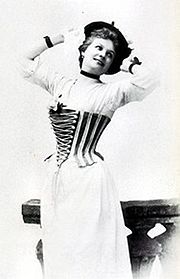
La belle Hélène
La belle Hélène , opéra bouffe in three acts, is an operetta by Jacques Offenbach to an original French libretto by Henri Meilhac and Ludovic Halévy...
(Offenbach
Jacques Offenbach
Jacques Offenbach was a Prussian-born French composer, cellist and impresario. He is remembered for his nearly 100 operettas of the 1850s–1870s and his uncompleted opera The Tales of Hoffmann. He was a powerful influence on later composers of the operetta genre, particularly Johann Strauss, Jr....
); Fiametta in Boccaccio (von Suppé
Franz von Suppé
Franz von Suppé or Francesco Suppé Demelli was an Austrian composer of light operas who was born in what is now Croatia during the time his father was working in this outpost of the Austro-Hungarian Empire...
); Denise in Mam'zelle Nitouche
Mam'zelle Nitouche
Mam'zelle Nitouche is a vaudeville-opérette by Hervé. The libretto was by Henri Meilhac and Albert Millaud.-Performance history:It was first performed at the Théâtre des Variétés, Paris on 26 January 1883.- Roles :-Synopsis:...
(Hervé
Hervé (composer)
Hervé , real name Louis Auguste Florimond Ronger, was a French singer, composer, librettist, conductor and scene painter, whom Ernest Newman, following Reynaldo Hahn, credited with inventing the genre of operetta in Paris.-Life:Hervé was born in Houdain near Arras...
; Nebántsvirág in Hungarian); Yvonne in The Pirate King (Planquette
Robert Planquette
Jean Robert Planquette was a French composer of songs and operettas.Several of Planquette's operettas were extraordinarily successful in Britain, including Les cloches de Corneville , the length of whose initial London run broke all records for any piece of musical theatre up to that time, and Rip...
); Yum-Yum in The Mikado
The Mikado
The Mikado; or, The Town of Titipu is a comic opera in two acts, with music by Arthur Sullivan and libretto by W. S. Gilbert, their ninth of fourteen operatic collaborations...
(Sullivan
Arthur Sullivan
Sir Arthur Seymour Sullivan MVO was an English composer of Irish and Italian ancestry. He is best known for his series of 14 operatic collaborations with the dramatist W. S. Gilbert, including such enduring works as H.M.S. Pinafore, The Pirates of Penzance and The Mikado...
); the title role in The Grand Duchess of Gerolstein (Offenbach); Lisbeth in Rip Van Winkle
Rip Van Winkle (operetta)
Rip Van Winkle is an operetta in three acts by Robert Planquette. The English libretto by Henry Brougham Farnie was based on the stories The Legend of Sleepy Hollow and Rip Van Winkle by Washington Irving after the play by Dion Boucicault and Joseph Jefferson.-Performance history:The operetta...
(Planquette); and Bronislawa in A koldusdiák – The Beggar Student
Der Bettelstudent
Der Bettelstudent is an operetta in three acts by Carl Millöcker with a German libretto by Camillo Walzel and Richard Genée, based on Les noces de Fernande by Victorien Sardou and The Lady of Lyons by Edward Bulwer-Lytton...
(Karl Millöcker
Karl Millöcker
Carl Joseph Millöcker , was an Austrian composer of operettas and a conductor.He was born in Vienna, where he studied the flute at the Vienna Conservatory. While holding various conducting posts in the city, he began to compose operettas...
).
In June 1895, she made her first appearance on the London stage as a guest artist with the Ducal Court Theare Company of Saxe-Coburg-Gotha as Christel in five performances of Der Vogelhändler at the Drury Lane Theatre
Theatre Royal, Drury Lane
The Theatre Royal, Drury Lane is a West End theatre in Covent Garden, in the City of Westminster, a borough of London. The building faces Catherine Street and backs onto Drury Lane. The building standing today is the most recent in a line of four theatres at the same location dating back to 1663,...
. W. S. Gilbert
W. S. Gilbert
Sir William Schwenck Gilbert was an English dramatist, librettist, poet and illustrator best known for his fourteen comic operas produced in collaboration with the composer Sir Arthur Sullivan, of which the most famous include H.M.S...
saw her there and hired her to play the leading role of Julia Jellicoe in The Grand Duke
The Grand Duke
The Grand Duke; or, The Statutory Duel, is the final Savoy Opera written by librettist W. S. Gilbert and composer Arthur Sullivan, their fourteenth and last opera together. It premiered at the Savoy Theatre on March 7, 1896, and ran for 123 performances...
, expanding the role to take advantage of her comic talents. Pálmay earned very favourable notices from the critics. Pálmay signed a two-year contract with the D'Oyly Carte Opera Company
D'Oyly Carte Opera Company
The D'Oyly Carte Opera Company was a professional light opera company that staged Gilbert and Sullivan's Savoy operas. The company performed nearly year-round in the UK and sometimes toured in Europe, North America and elsewhere, from the 1870s until it closed in 1982. It was revived in 1988 and...
, but The Grand Duke ran for only four months in 1896. After it closed, she created the role of Felice in His Majesty at the Savoy in the spring of 1897. His Majesty gave Pálmay opportunities to display her talents as ballad singer, opera soprano and comedienne, including the chance to sing in German, the language in which she usually performed. The song, "Das Kleine Fraülein Müffchen," is a German version of "Little Miss Muffet
Little Miss Muffet
"Little Miss Muffet" is a nursery rhyme, one of the most commonly printed in the mid-twentieth century. It has a Roud Folk Song Index number of 20605.-Lyrics:-Alternative Lyrics:...
". Pitting the weak-voiced George Grossmith
George Grossmith
George Grossmith was an English comedian, writer, composer, actor, and singer. His performing career spanned more than four decades...
against the histrionic Pálmay may have speeded his departure from the production after only four performances. Pálmay next appeared as Elsie in the revival of The Yeomen of the Guard
The Yeomen of the Guard
The Yeomen of the Guard; or, The Merryman and His Maid, is a Savoy Opera, with music by Arthur Sullivan and libretto by W. S. Gilbert. It premiered at the Savoy Theatre on 3 October 1888, and ran for 423 performances...
in the summer of 1897. Pleading ill health, she left D'Oyly Carte in July 1897.
Later years
Pálmay appeared in Vienna in 1898-99, but she spent most of her career in Budapest. In 1905, she appeared briefly in German-language theatre in New York, but soon returned to Hungary. In 1911, she won the national Hungarian theatre's honorary prize. Pálmay played many roles from opera and operetta during her long career, as noted below. In 1928, she retired from performing.Pálmay recorded two songs in Vienna in 1900 and several in Budapest in 1903. The latter group of songs included one in English, "Butterfly," a folk song. She also recorded "Madrigal" from Ninoche and "A Little Bit of String" from The Circus Girl
The Circus Girl
The Circus Girl is a musical comedy in two acts by James T. Tanner and Walter Apllant , with lyrics by Harry Greenbank and Adrian Ross, music by Ivan Caryll, and additional music by Lionel Monckton....
. All of these can be heard on The Art of the Savoyard (Pearl GEMM CD 9991).
Writing as Countess Kinsky, Pálmay eventually published her memoirs in Hungarian. They were published in Berlin in 1911 in German translation as Meine Erinnerungen (My Memories). A chapter of the book about her days at the Savoy was translated into English by Andrew Lamb
Andrew Lamb (writer)
Andrew Martin Lamb is an English writer, musicologist and broadcaster, known for his expertise in light music and musical theatre.-Biography:Lamb was born in Oldham, Lancashire, England, on 23 September 1942, the son of Harry Lamb, a schoolmaster, and his wife Winifred, née Emmott...
and was printed in the May and September 1972 issues of The Gilbert & Sullivan Journal. In the memoir, she describes plans by D'Oyly Carte to produce a musical version of Victorien Sardou
Victorien Sardou
Victorien Sardou was a French dramatist. He is best remembered today for his development, along with Eugène Scribe, of the well-made play...
's Madame Sans-Gêne in the company's 1897–98 season, but those plans were cancelled.
Pálmay died in Budapest at the age of 85.
Roles
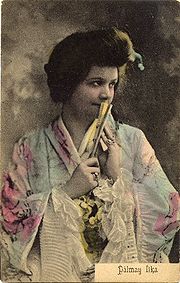
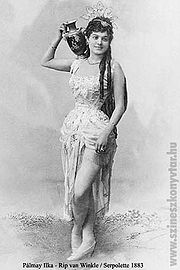
- Giacomo PucciniGiacomo PucciniGiacomo Antonio Domenico Michele Secondo Maria Puccini was an Italian composer whose operas, including La bohème, Tosca, Madama Butterfly, and Turandot, are among the most frequently performed in the standard repertoire...
/David BelascoDavid BelascoDavid Belasco was an American theatrical producer, impresario, director and playwright.-Biography:Born in San Francisco, California, where his Sephardic Jewish parents had moved from London, England, during the Gold Rush, he began working in a San Francisco theatre doing a variety of routine jobs,...
: Madama ButterflyMadama ButterflyMadama Butterfly is an opera in three acts by Giacomo Puccini, with an Italian libretto by Luigi Illica and Giuseppe Giacosa. Puccini based his opera in part on the short story "Madame Butterfly" by John Luther Long, which was dramatized by David Belasco...
– Cio-Cio-San - Ferenc Csepreghy: Sárga csikó (Yellow Foal) – Erzsike (Elizabeth)
- Ferenc Csepreghy: A piros bugyelláris (The Red Purse) – Török Zsófi (Turkish girl Zsófi)
- Ferenc Csepreghy: A tót leány – Misu
- Gilbert and SullivanGilbert and SullivanGilbert and Sullivan refers to the Victorian-era theatrical partnership of the librettist W. S. Gilbert and the composer Arthur Sullivan . The two men collaborated on fourteen comic operas between 1871 and 1896, of which H.M.S...
: The Grand DukeThe Grand DukeThe Grand Duke; or, The Statutory Duel, is the final Savoy Opera written by librettist W. S. Gilbert and composer Arthur Sullivan, their fourteenth and last opera together. It premiered at the Savoy Theatre on March 7, 1896, and ran for 123 performances...
– Julia Jellicoe (in English, London) - Gilbert and Sullivan: The Yeomen of the GuardThe Yeomen of the GuardThe Yeomen of the Guard; or, The Merryman and His Maid, is a Savoy Opera, with music by Arthur Sullivan and libretto by W. S. Gilbert. It premiered at the Savoy Theatre on 3 October 1888, and ran for 423 performances...
– Elsie Maynard - Gilbert and Sullivan: The MikadoThe MikadoThe Mikado; or, The Town of Titipu is a comic opera in two acts, with music by Arthur Sullivan and libretto by W. S. Gilbert, their ninth of fourteen operatic collaborations...
– Yum-Yum (in Germany) - Károly Gerő: Vadgalamb (Culver) – Rica a pásztorlány (Rica the shepherdess)
- Charles GrisartCharles GrisartCharles Jean Baptiste Grisart was a French operatic composer.-Operas:*La Quenouille de verre *Les Trois Margots *Le Pont d'Avignon...
: A királykisasszony bábui – Les Poupées de l'Infante – main role - HervéHervé (composer)Hervé , real name Louis Auguste Florimond Ronger, was a French singer, composer, librettist, conductor and scene painter, whom Ernest Newman, following Reynaldo Hahn, credited with inventing the genre of operetta in Paris.-Life:Hervé was born in Houdain near Arras...
: Mam'zelle NitoucheMam'zelle NitoucheMam'zelle Nitouche is a vaudeville-opérette by Hervé. The libretto was by Henri Meilhac and Albert Millaud.-Performance history:It was first performed at the Théâtre des Variétés, Paris on 26 January 1883.- Roles :-Synopsis:...
(Nebántsvirág in Hungarian) – Denise - Hennequin & Millaud: Niniche – Niniche
- Charles Lecocq: Nap és hold (Le Jour et la Nuit) – Manola
- Charles Lecocq: The Gardener Girl – Micaela
- Alexander MacKenzieAlexander Mackenzie (musician)Sir Alexander Campbell Mackenzie KCVO was a Scottish composer, conductor and teacher best known for his oratorios, violin and piano pieces, Scottish folk music and works for the stage....
: His Majesty - Felice - Andre MessagerAndré MessagerAndré Charles Prosper Messager , was a French composer, organist, pianist, conductor and administrator. His stage compositions included ballets and 30 opéra comiques and operettas, among which Véronique, had lasting success, with Les p'tites Michu and Monsieur Beaucaire also enjoying international...
: A beárni leány – La béarnaise – the main role - Karl MillöckerKarl MillöckerCarl Joseph Millöcker , was an Austrian composer of operettas and a conductor.He was born in Vienna, where he studied the flute at the Vienna Conservatory. While holding various conducting posts in the city, he began to compose operettas...
: A koldusdiák (Der BettelstudentDer BettelstudentDer Bettelstudent is an operetta in three acts by Carl Millöcker with a German libretto by Camillo Walzel and Richard Genée, based on Les noces de Fernande by Victorien Sardou and The Lady of Lyons by Edward Bulwer-Lytton...
- The Beggar Student) – Bronislawa - Karl Millöcker: GasparoneGasparoneGasparone is an operetta in three acts by Carl Millöcker to a German libretto by Friedrich Zell and Richard Genée. The libretto was later revised by Ernst Steffan and Paul Knepler...
– Carlotta - Jacques OffenbachJacques OffenbachJacques Offenbach was a Prussian-born French composer, cellist and impresario. He is remembered for his nearly 100 operettas of the 1850s–1870s and his uncompleted opera The Tales of Hoffmann. He was a powerful influence on later composers of the operetta genre, particularly Johann Strauss, Jr....
: La Grande-Duchesse de GérolsteinLa Grande-Duchesse de GérolsteinLa Grande-Duchesse de Gérolstein is an opéra bouffe , in three acts and four tableaux by Jacques Offenbach to an original French libretto by Henri Meilhac and Ludovic Halévy...
(The Grand Duchess of Gérolstein) – the title role - Jacques Offenbach: La belle HélèneLa belle HélèneLa belle Hélène , opéra bouffe in three acts, is an operetta by Jacques Offenbach to an original French libretto by Henri Meilhac and Ludovic Halévy...
– Hélène - Jacques Offenbach: Orpheus in the UnderworldOrpheus in the UnderworldOrphée aux enfers is an opéra bouffon , or opéra féerie in its revised version, by Jacques Offenbach. The French text was written by Ludovic Halévy and later revised by Hector-Jonathan Crémieux....
– Eurydice - Robert PlanquetteRobert PlanquetteJean Robert Planquette was a French composer of songs and operettas.Several of Planquette's operettas were extraordinarily successful in Britain, including Les cloches de Corneville , the length of whose initial London run broke all records for any piece of musical theatre up to that time, and Rip...
: Rip van WinkleRip Van Winkle (operetta)Rip Van Winkle is an operetta in three acts by Robert Planquette. The English libretto by Henry Brougham Farnie was based on the stories The Legend of Sleepy Hollow and Rip Van Winkle by Washington Irving after the play by Dion Boucicault and Joseph Jefferson.-Performance history:The operetta...
– Lisbeth - Robert Planquette: The Pirate King – Yvonne
- Robert Planquette: Les Cloches de CornevilleLes cloches de CornevilleLes cloches de Corneville is an operetta in three acts, composed by Robert Planquette to a French libretto by Louis Clairville and Charles Gabet based on a play by Gabet.In 1876, the director of the Théâtre des Folies-Dramatiques, Louis Cantin, hired Planquette to compose the operetta,...
– Serpolette, the good-for-nothing. - Robert Planquette: A komédiás hercegnő – main role
- Jenő Rákosi: Magdolna – Magda
- Jenő Rákosi: Szélháziak – Cseresnyés Alfréd, the lawyer
- Franz von SuppéFranz von SuppéFranz von Suppé or Francesco Suppé Demelli was an Austrian composer of light operas who was born in what is now Croatia during the time his father was working in this outpost of the Austro-Hungarian Empire...
: BoccaccioBoccaccio (Suppé)Boccaccio, or the Prince of Palermo is an operetta in three acts by Franz von Suppé to a German libretto by Camillo Walzel and Richard Genée, based on the play by Jean-François-Antoine Bayard, Adolphe de Leuven, Léon Lévy Brunswick and Arthur de Beauplan, based in turn on the Decameron of Giovanni...
– Fiametta - Johann Strauss IIJohann Strauss IIJohann Strauss II , also known as Johann Baptist Strauss or Johann Strauss, Jr., the Younger, or the Son , was an Austrian composer of light music, particularly dance music and operettas. He composed over 500 waltzes, polkas, quadrilles, and other types of dance music, as well as several operettas...
: The Gypsy BaronThe Gypsy BaronThe Gypsy Baron is an operetta in three acts by Johann Strauss II which premiered at the Theater an der Wien on 24 October 1885. Its libretto was by the author Ignaz Schnitzer and in turn was based on Sáffi by Mór Jókai. During the composer's lifetime, the operetta enjoyed great success, second...
– Barinkay - Johann Strauss II: Das Spitzentuch der Königin (The Queen's Lace Handkerchief) – main role
- Johann Strauss II: Fürstin Ninetta (Princess Ninetta) - title role
- Franz SchubertFranz SchubertFranz Peter Schubert was an Austrian composer.Although he died at an early age, Schubert was tremendously prolific. He wrote some 600 Lieder, nine symphonies , liturgical music, operas, some incidental music, and a large body of chamber and solo piano music...
- Besté: Három a kislány – Tscöllné - Joseph SzigetiJoseph SzigetiJoseph Szigeti was a Hungarian violinist.Born into a musical family, he spent his early childhood in a small town in Transylvania. He quickly proved himself to be a child prodigy on the violin, and moved to Budapest with his father to study with the renowned pedagogue Jenő Hubay...
: Csókon szerzett vőlegény – Ábrai Irén színésznő - Carl ZellerCarl ZellerCarl Adam Johann Nepomuk Zeller was an Austrian composer of operettas.Zeller was born in Sankt Peter in der Au, the only child of physician Johann Zeller and Maria Anna Elizabeth. Zeller's father died before his first birthday, after which his mother remarried Ernest Friedinger...
: Der VogelhändlerDer VogelhändlerDer Vogelhändler is an operetta in three acts by Carl Zeller with a libretto by Moritz West and Ludwig Held based on Varin and Biéville's Ce que deviennent les roses....
- Christel (Milka in Hungarian) - Émile ZolaÉmile ZolaÉmile François Zola was a French writer, the most important exemplar of the literary school of naturalism and an important contributor to the development of theatrical naturalism...
: NanaNana (novel)Nana is a novel by the French naturalist author Émile Zola. Completed in 1880, Nana is the ninth installment in the 20-volume Les Rougon-Macquart series, the object of which was to tell "The Natural and Social History of a Family under the Second Empire", the subtitle of the series.-Origins:A year...
(based on Zola's novel) – main role

